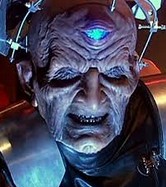 very night I lie awake, turning in my bed, asking myself: Why oh why didn't I go into
my first love: designing H-bombs?
very night I lie awake, turning in my bed, asking myself: Why oh why didn't I go into
my first love: designing H-bombs?
How well I remember the days when my parents would say to me, “Hey you, stop building that thermonuclear warhead and get outside and play . . . like a normal kid!” “And stop holding the door open! Are you trying to irradiate the whole outside?”
Okay, I exaggerate. But the fact is, what is high tech to one generation is ordinary to the next. Pretty soon, every Tom, Dick, and Jong-un will have intercontinental ballistic missiles, H-bombs, and high-energy weapons. Forget about the danger from artificial intelligence. In the real world, danger usually comes from places we never considered. What will we do when individuals get this capability?
That this can occur strikes me as evidence that our universe has a fatal flaw. We see this in the movies: in Star Wars, the Dark Side of the force is clearly a lot stronger than the good side. Sure, Yoda denies it, but you can tell he's lying. Look at what happens: the humans discover a magical thing called The Force. A movement of Jedi knights evolves to study it. The Jedi are clairvoyant and can see the future, but for some odd reason when the emperor decides to exterminate them, it comes as a complete surprise. QED.
Davros
Physicists tell us that a phase change in the structure of spacetime could happen anywhere at any moment. It would create a bubble that would expand at the speed of light. Since it would be spherical, we would be unable to know of its existence until—in the blink of an eye—the atoms in our bodies were converted into something else, and we'd cease to exist.
Davros, the un-killable mad scientist on the British TV show Doctor Who, tested the hypothesis by building a device that would do just that: his reality bomb, the story went, cancels out electrical charge, thereby disintegrating all matter in the universe. Hmm. . . .

Bad guys have more fun
Davros is so ridiculously over the top that it stretches the imagination, yet the show depends on him and his Daleks. He's the only character who does—or says—anything intelligent. In the episode where he's dying, he and The Doctor get philosophical. It was a rare moment of intelligent dialogue, and most viewers hated it.
Those Daleks had no say in how they were created, but they're evil and so they can be blown to bits without consequence. The writers sometimes recognize that this creates moral issues. But without an endless bag of magic tricks, the Doctor wouldn't last ten minutes.
Sadly, like so much else, this show has turned political, and so it's become dull and predictable.
Moldyvort
In the Harry Potter movies, we have another fatally flawed universe. People have magical powers, and so all it takes is one bad guy, the One Who Has No Nose And So Can Never Sneeze, to wipe them out, which would have happened but for an improbable combination of dumb luck and galaxy-class plot holes.
In Harry Potter, the good guys are also fatally flawed. If somebody were being chased by a gigantic snake, the last thing they'd do is embrace somebody of the opposite sex and kiss them. Only by several highly improbable bits of dumb luck and the help of his friends does Harry manage to defeat the much stronger and smarter villain.
Darth Vader
What these sci-fi train wrecks all have in common is the theme of the dumb, innocent, but likable everyday person defeating a much more powerful enemy by virtue of conforming to our collective social norms. To make it work, they have to make the bad guy amazingly intelligent, which is why Luke Skywalker in Star Wars is such an intellectual pipsqueak compared to the much smarter and more ambitious villains. The dynamics of these movies demand that the side of good be populated with little children, Teddy bears, and cute doofuses. The smarter the enemies, the more the forces of good must work together and the more satisfying it is to the collectivist herd when they succeed.
But it also creates a fatally flawed world, and maybe that's why the original Star Trek still resonates: at least the bad guys were mostly computers that had some easily exploitable programming flaw. Though it remained true to its '60s roots by having its starships powered by giant blue lava lamps, later versions all floundered until the writers created villains like the Borg or the Xindi. Without evil, Star Trek is telling us, we become stupider, lazier, and more politically correct, which means we can only substitute one form of tyranny for another. If true, it certainly qualifies as a flaw in the universe.
Mark Zuckerberg
Still, I'm sentimental about biological life. Humans are still a mystery because biology has had billions of years to devise its own highly sophisticated programming, and science has barely scratched the surface of it.
But what if that is only a self-affirming delusion? There's no a priori reason why either the universe or human nature should be free of fatal flaws.
We see clues of this in human nature: humans invent clever things, like Facebook, and are shocked to discover that people post pictures of their genitalia and call each other nasty names. Then the humans try to censor the things they don't want to hear. They don't want to admit the possibility that they, like the universe, might have a fatal flaw. But our dystopic fiction, like some entity from another world, is trying to tell us otherwise.
dec 24, 2017, 7:56 am. last edited dec 24, 2017, 1:12 pm
